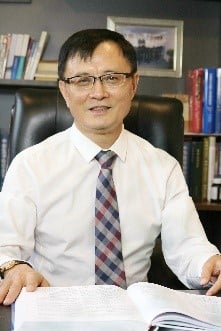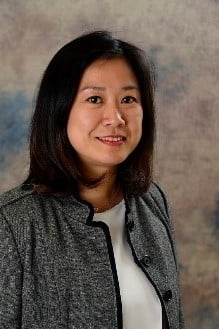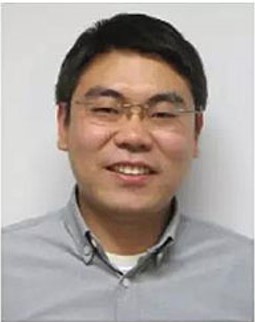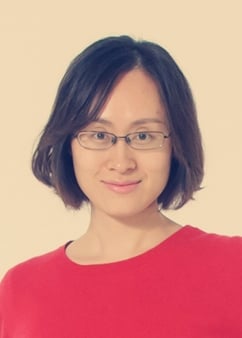Honorary Editor-in-Chief

|
Haibo Song, China Association of In Vitro Diagnostics, Shanghai, China Haibo Song, Successively served as Deputy Director of Anhui Provincial Center for Clinical Laboratories, Deputy Chairman of Anhui Micro-Improvement Society, Secretary General of Blood Transfusion Quality Management Committee of Anhui Provincial Health Bureau, Vice Chairman of National Association of Health Industry and Enterprises Management, Chairman of China Association of In Vitro Diagnostics, Secretary General of Experimental Medical Professional Committee, Standing committee member of the National Medical Clinical Laboratory and the Standardization Technical Committee of the In Vitro Diagnostic System, Chief Editor of www.caivd-org.cn and www.caclp.cn, Chief Editor of the editorial board of China IVD Industry Development Year book, Editorial board member of World Journal of Complex Medicine, Chinese Journal of Primary Medicine and Pharmacy and International Journal of Laboratory Medicine and so on, Visiting professor of Tianjin Medical University and Jilin Medical College, Specially-appointed Researcher of China Medical Device Policy Research and Security Evaluation Center. |
Editor-in-Chief

|
Hualiang Wang, Professional Community of Experimental Medicine, Shanghai, China Hualiang Wang, Doctor of Medicine, second-level Professor, Doctoral Supervisor, special allowance expert of the State Council Government. He successively served as Director of Shanghai Clinical Laboratory Center and Editor-in-chief of the Journal of Laboratory Medicine. He is now the Dean of Shanghai Academy of Experimental Medicine and Director of Industrial Research Institute, Director of PCEM (Professional Community of Experimental Medicine). He has successively hosted or participated in more than 20 scientific research projects, such as the 13th five-year major special project, national natural science fund, national postdoctoral fund, major projects of Shanghai, major projects of production, study and research of the municipal science and technology commission, municipal natural science fund, and key projects of the municipal health and family planning commission; he has won the first prize of Shanghai science and technology award, military medical achievement award and so on; He has published many papers in journals such as Science, Clinical Biochemistry, Applied microbiology and biotechnology, Clinical chemistry and laboratory medicine, Accreditation and Quality Assurance and so on. |

|
Zhi Yao, Tianjin Medical University, Tianjin, China Zhi Yao, served as Director of Key Laboratory of Immune Microenvironment and Diseases of Educational Ministry of China, Member of the State Council Municipal Discipline Appraisal Group, Executive Director of the Chinese Society for Immunology, Chairman of the 7th Chinese Society for Microbiology and Immunology, Director of Tianjin Society for Immunology, Executive Director of Tianjin Union of Life Science Societies. Dr. Yao has been long engaged in research of immune polypeptides in tumorigenesis, and screened several small molecule compounds with specific targets. Two compounds targeting tumor metastasis have acquired clinical trial approvals by the CFDA, which are undergoing phase I and phase III clinical trials, respectively. Dr. Yao earns the title of National Expert with Remarkable Contributions of Ministry of Public Health and receives the State Council special allowance. |
Associate Editors

|
Gang Han, University of Massachusetts Medical School, Worcester, USA Gang Han is currently a Professor in the Biochemistry and Molecular Pharmacology Department at University of Massachusetts- Medical School. He received his B.Sc. and M.S. degrees in Chemistry from Nanjing University, and his Ph.D. degree in Chemistry from University of Massachusetts-Amherst. He was a postdoctoral scholar at the Molecular Foundry, Lawrence Berkeley National Lab. Dr. Han has published over 100 papers in Journals such as Cell, Nature, Nature Nanotechnology, Nature Communications, Elife, PNAS, JACS, Angewandte chemie, Advanced Materials, Nano Letters, ACS Nano, which have cited over 11000 times. He was honored awards such as NIH Exceptional Unconventional Research Enabling Knowledge Acceleration (EUREKA) Award, NIH/NCI Innovative Research in Cancer Nanotechnology (IRCN) Award and Human Frontier Science Program Young Investigator Award, Worcester Foundation Mel Cutler Award. His current research focuses on the development of biocompatible functional luminescent nanoparticles and molecules for optical imaging, sensing and light controlled immune-engineering and neuron activation. |

|
Kun Qian, Shanghai Jiao Tong University, Shanghai, China Kun Qian is now a principal investigator (PI) at School of Biomedical Engineering, Shanghai Jiao Tong University. He obtained his BS/MS at Fudan University, Ph.D. at University of Queensland, Research Fellow at Stanford University. His research interests and efforts are focused on the development and commercialization of ultra-sensitive and high-throughput bio-analytical methods and mass spectrometry techniques towards large-scale clinical use through design, synthesis, and engineering of materials and devices. He has co-authored over 50 peer-reviewed articles in top international journals, including Nat Com, ACS Cen Sci, Adv Mater, Adv Funct Mater, Adv Sci, ACS Nano et al. Dr. Qian has attracted grants from top research programs (e. g. from NSFC) and received several prestigious domestic/international awards for research excellence. He held several key patents and had strong connections with domestic and international industry partners. |

|
Sunitha Nagrath, University of Michigan, Ann Arbor, USA Sunitha Nagrath is an Associate Professor of Chemical Engineering at University of Michigan. Dr. Nagrath did her Bachelor’s degree in Chemical Engineering from Sri Venkateswara University College of Engineering, Tirupathi, India. She received her Ph.D. in 2004 from Rensselaer Polytechnic Institute, Troy, NY in Mechanical Engineering. She did her postdoctoral work (2004-2008) at Harvard Medical/Massachusetts General Hospital, Boston, MA. She later worked as an instructor/junior faculty at Harvard Medical School. Dr. Nagrath is the leading scientist who designed the MEMS based technology, “CTC-Chip” for the sensitive isolation of circulating tumor cells (CTCs) from the blood of cancer patients. Her work challenged and changed the then-current paradigm of CTC isolation and concurrently increased the relevance of CTCs in cancer research, thereby accelerating the pace of CTC research. Dr. Nagrath was awarded the prestigious NIH Director’s New Innovator Award DP2 in 2009. She won many accolades including Lefkofsky scholar award, DOD career development award, and Coulter Translational Research award. |

|
Sierin Lim, Nanyang Technological University, Singapore, Singapore Sierin Lim is an Associate Professor of Bioengineering at the School of Chemical and Biomedical Engineering and the Associate Dean for Global Partnerships at the Graduate College, Nanyang Technological University (NTU) Singapore. She earned her B.S. in Chemical Engineering and Ph.D. in Biomedical Engineering from University of California Los Angeles (UCLA) and did a postdoc at UC Irvine. Her group at NTU focuses on the design and engineering of hybrid nano/microscale devices from biological parts by utilizing protein engineering as a tool for applications in medicine, energy, cosmetics, and food. |

|
Jiatao Lou, Shanghai Jiao Tong University, Shanghai, China Jiatao Lou, Director of Laboratory Medicine Department of Shanghai General Hospital, and doctoral supervisor of Shanghai Jiao Tong University School of Medicine. He is vice chairman of Molecular Diagnosis branch of Shanghai Medical Association, standing committee and secretary of Laboratory Medicine branch of Shanghai Medical Association, and chairman of Expert Committee of Experimental Medicine (Youth) in National Association of Health Industry and Enterprise Management. His research areas include early and personal diagnosis of thoracic tumors. He has published more than 20 peer-reviewed articles on international journals including Molecular Cancer, Cancer Research, EMBO J and Advanced Functional Materials, and has been funded by over 10 research programs including 2 from Natural Science Foundation of China. |

|
Rosa Chen, Beckman Coulter, Shanghai, China Rosa Chen is the Vice President & General Manager, China of Beckman Coulter. She joined the company in September 2021 to help lead Danaher Business System (DBS) for China Dx platform. Prior to joining Danaher, she has spent 10 years in Philips Healthcare where she served in various commercial leadership roles, including VP & GM of Ultrasound business, and GM of Respiratory care business. Prior to Philips, Rosa spent 8 years with Johnson & Johnson Medical with roles of increasing responsibilities in marketing and strategy development. She started her career in sales in Sinochem corporation. Rosa holds MBA from Thunderbird American Graduate School of International Management, majoring in Marketing and International Management, and a Bachelor of Economics from Guangdong University of Foreign Studies. |
 |
Feng Xu, Xi’an Jiaotong University, Xi’an, China Feng Xu is currently a Professor in Biomechanics and Biomedical Engineering, and also the Director of The Key Laboratory of Biomedical Information Engineering of Ministry of Education. He received his Ph.D. from Cambridge University and worked as a research fellow at Harvard Medical School and Harvard-MIT Health Science & Technology (HST). Dr. Xu’s current research aims at advancing human health through academic excellence in education and research that integrates engineering, science biology and medicine with focus on Engineering of Cell Microenvironment and Point-of-Care Technologies. Dr. Xu is internationally recognized for his research in these fields. He has edited multiple books / journal special issues and is an author on more than 350 peer-reviewed journal articles, editorials and review papers, 20 book chapters/books, and 70 issued patents. His work has been published in leading journals and routinely highlighted in international media. He has been cited >21,000 times by high profile journals with an H-index of 72. Among the published papers, there are 21 papers selected as ESI Highly Cited Papers and ESI Hot Paper, together with more than 60 papers highlighted as journal covers. Dr. XU’s interdisciplinary research has been awarded the “National Natural Science Award”, the Science and Technology Award of the Ministry of Education, the “Chinese Medical Science and Technology Award”, and other science and technology awards. Dr. Xu has been recognized in the Top 2% Scientists Worldwide (2020/2021) and also Clarivate Highly Cited Researchers (2021). |

|
Peng Huang, Shenzhen University Medical School, Shenzhen, China Peng Huang is currently a Distinguished Professor, Chief of the Laboratory of Evolutionary Theranostics (LET), and Director of the Department of Molecular Imaging, at the School of Biomedical Engineering, Shenzhen University Medical School, China. He received his Ph.D. degree in Biomedical Engineering from the Shanghai Jiao Tong University in 2012. He then joined the Laboratory of Molecular Imaging and Nanomedicine (LOMIN) at the National Institutes of Health (NIH) as a postdoctoral fellow. In 2015, he moved to Shenzhen University as a Distinguished Professor. Dr. Huang has published 280 papers in journals such as Nature Biomedical Engineering, Nature Communications, Matter, JACS, Angewandte Chemie, Advanced Materials, ACS Nano, Advanced Functional Materials, Nano Letters, Theranostics, Chemical Reviews, Chemical Society Reviews, Accounts of Chemical Research, etc., which have received a total citation of > 28,000 times and given him an H-index at 88. He was selected as 2020, 2021 and 2022 Global Highly Cited Researcher in the field of Cross-Field by Clarivate. He was honored awards such as China Anti-Cancer Youth Scientist Award, Science and Technology Award for Shenzhen Youth, and Fellows Award for Research Excellence (FARE) of NIH. His current research focuses on molecular imaging, nanomedicine and theranostics. |

|
Lin Mei, Institute of Biomedical Engineering, Peking Union Medical College & Chinese Academy of Medical Sciences, Tianjin, China Lin Mei received his B.S. degree from Fudan University in 2003 and Ph.D. degree from Peking Union Medical College, Tsinghua University, in 2007. He was a postdoctoral scholar at the National University of Singapore and Tsinghua University. He is a professor of Institute of Biomedical Engineering, Peking Union Medical College & Chinese Academy of Medical Sciences. He is also a professor of Xiangya School of Pharmacy, Central South University. Dr. Mei has published over 150 papers in journals such as Science Translational Medicine, Nature Communications, Science Advances, PNAS, Angewandte Chemie International Edition, Advanced Materials, Advanced Functional Materials, ACS Nano, Advanced Drug Delivery Reviews, Nano Letters, Advanced Science, Journal of Controlled Release, Biomaterials and Matter, which have cited over 11,000 times. His research interests are focused on biomedical materials, nanomedicine, molecular pharmaceutics and drug/gene delivery. |

|
Donghwan Kim, Sungkyunkwan University (SKKU), Seoul, Republic of Korea Prof. Donghwan Kim, known as Richie, has been a professor in the School of Chemical Engineering at Sungkyunkwan University (SKKU) since 2015. Prior to joining SKKU, he held the position of assistant/associate professor in the School of Chemical and Biomolecular Engineering at Nanyang Technological University from 2007 to 2015. His passion for advancing his professional career is evident through his multifaceted roles, including Director of the Precision Biology Research Center and the Global Talent Fostering Program at SKKU. His current research interests lie in plasmonic biosensors, wearable and flexible sensors, quantum sensors, and upconversion materials. |
Editorial Board Members
![]() Xiaodong Chen, Nanyang Technological University, Singapore, Singapore
Xiaodong Chen, Nanyang Technological University, Singapore, Singapore
![]() João Conde, Universidade Nova de Lisboa, Lisbon, Portugal
João Conde, Universidade Nova de Lisboa, Lisbon, Portugal
![]() Wenguo Cui, Shanghai Jiao Tong University, Shanghai, China
Wenguo Cui, Shanghai Jiao Tong University, Shanghai, China
![]() Chunhai Fan, Shanghai Jiao Tong University, Shanghai, China
Chunhai Fan, Shanghai Jiao Tong University, Shanghai, China
![]() Qinghua He, Nanchang University, Nanchang, China
Qinghua He, Nanchang University, Nanchang, China
![]() Aleksandar Ivanov, Imperial College London, London, UK
Aleksandar Ivanov, Imperial College London, London, UK
![]() Ali Khademhosseini, University of California-Los Angeles, Los Angeles, USA
Ali Khademhosseini, University of California-Los Angeles, Los Angeles, USA
![]() Luke Lee, University of California, Berkeley, USA
Luke Lee, University of California, Berkeley, USA
![]() Chwee Teck Lim, National University of Singapore, Singapore, Singapore
Chwee Teck Lim, National University of Singapore, Singapore, Singapore
![]() Yuehe Lin, Washington State University, Pullman, USA
Yuehe Lin, Washington State University, Pullman, USA
![]() Qingjun Liu, Zhejiang University, Hangzhou, China
Qingjun Liu, Zhejiang University, Hangzhou, China
![]() Zhe Liu, Tianjin University, Tianjin, China
Zhe Liu, Tianjin University, Tianjin, China
![]() Niren Murthy, University of California, Berkeley, USA
Niren Murthy, University of California, Berkeley, USA
![]() Je-Kyun Park, Korea Advanced Institute of Science and Technology, Daejeon, Korea
Je-Kyun Park, Korea Advanced Institute of Science and Technology, Daejeon, Korea
![]() Kanyi Pu, Nanyang Technological University, Singapore, Singapore
Kanyi Pu, Nanyang Technological University, Singapore, Singapore
![]() Jianhua Qin, Dalian Institute of Chemical Physics, CAS, Dalian, China
Jianhua Qin, Dalian Institute of Chemical Physics, CAS, Dalian, China
![]() Milica Radisic, University of Toronto, Toronto, Canada
Milica Radisic, University of Toronto, Toronto, Canada
![]() Hélder A. Santos, University of Helsinki, Helsinki, Finland
Hélder A. Santos, University of Helsinki, Helsinki, Finland
![]() Amy Shen, Okinawa Institute of Science and Technology Graduate University, Okinawa, Japan
Amy Shen, Okinawa Institute of Science and Technology Graduate University, Okinawa, Japan
![]() Patrick M Sluss, Massachusetts General Hospital/Harvard Medical School · Pathology, Boston, USA
Patrick M Sluss, Massachusetts General Hospital/Harvard Medical School · Pathology, Boston, USA
![]() Joseph Wang, University California-San Diego, La Jolla, USA
Joseph Wang, University California-San Diego, La Jolla, USA
![]() Jingjuan Xu, Nanjing University, Nanjing, China
Jingjuan Xu, Nanjing University, Nanjing, China
![]() Yingwei Yang, Jilin University, Changchun, China
Yingwei Yang, Jilin University, Changchun, China
![]() Radek Zbořil, Palacky University in Olomouc, Olomouc, Czech Republic
Radek Zbořil, Palacky University in Olomouc, Olomouc, Czech Republic
![]() Xiao-Bing Zhang, Hunan University, Changsha, China
Xiao-Bing Zhang, Hunan University, Changsha, China
![]() Lei Zheng, Southern Medical University, Guangzhou, China
Lei Zheng, Southern Medical University, Guangzhou, China
![]() Songguo Zheng, Shanghai Jiao Tong University, Shanghai, China
Songguo Zheng, Shanghai Jiao Tong University, Shanghai, China
Consulting Editors

|
José Oliveira, John Wiley & Sons, Inc. José Oliveira obtained his B.Sc. (Hons) and Ph.D. at the University of the Witwatersrand, Johannesburg. Before joining Wiley in 2001, he worked at the University of Antwerp. He is the Editor-in-Chief of Small. |

|
Guangchen Xu, John Wiley & Sons, Inc. Guangchen Xu obtained his B.Sc. and Ph.D. (Hons) from the Beijing University of Technology. He spent a year at Michigan State University as a visiting scholar. Before joining the Wiley team in Beijing in 2011, he was an Assistant Professor at Beijing University of Technology. |

|
Jing Zhu, John Wiley & Sons, Inc. Jing Zhu completed her Ph.D. from Shanghai Jiao Tong University in 2011, during this period, she studied and worked in Guelph Food Research Centre, Agriculture and Agri-Food Canada as a joint Ph.D. student for 2 years. Jing joined Wiley in July 2011 as a journal Editor and is based in Wiley’s Shanghai office. |
Publisher
|
Xiaoyu Zhang, John Wiley & Sons, Inc. Xiaoyu Zhang earned his Ph.D. in Biochemistry from East China Normal University in 2018 and subsequently completed his postdoctoral training at the University of Pittsburgh in the United States. He joined Wiley as an Assistant Editor in August 2020 and swiftly to the position of Journal Publishing Manager within the China Physical Science team. Most recently, Xiaoyu has taken on the role of Deputy Editor at Advanced Science, while also serving as Manager of the co-publishing team for Physical Science in China. He is based in Shanghai. |